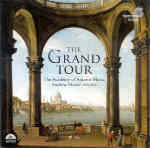The title of this best-of release is meant to refer to the featured compositions and composers. The Venice-based Vivaldi traveled extensively, perhaps as far away as Amsterdam. Handel, of course, was an expatriate in London, and went south to Rome as well; Geminiani also went to London. (Bach is the odd one out here, but perhaps we can graciously invert the formula and say that his music has traveled to every corner of the earth, even if he himself did not.) But in truth this is really a grand tour of some highlights in Andrew Manze’s impressive discography, following in the footsteps of the budget-priced (and still in print!) Andrew Manze Portrait, issued in 2000. In case you’re wondering if the material here duplicates any from the earlier compilation, the answer is “yes”–the Vivaldi E-flat major Concerto, the Handel G minor Concerto, and the D minor Concerto of Geminiani. Considering the richness of Manze’s catalog–more than 25 releases to choose from–it seems odd that Harmonia Mundi would have selected from the same few discs as before.
Having said that, however, the musicmaking is still sublime, and the sound is great. In reviewing that last compilation, I wrote, “[Manze] is among today’s pre-eminent musicians, and if you haven’t delved into his recordings yet, here’s a golden opportunity.” It’s a comment that bears repetition–every time I hear him, the experience is even more thrilling than the last. Vivaldi’s E-flat major Concerto, titled “The Tempest of the Sea”, is a stormy ride, and Manze’s Sinfonia is simply lovely. The Handel works are the height of elegance; just listen to the gorgeous Menuet from the D major Concerto. The Bach D minor Concerto sparkles, despite the stodgy presence of violinist Rachel Podger, who rarely matches Manze’s fire except in the closing, smartly turned out Allegro. As ever, the Geminiani is exhilarating. The Academy of Ancient Music, directed by Manze, is with him every step of the way, both technically and emotionally. A 10/10 to Manze and the sound engineers, then, and a raspberry to Harmonia Mundi’s repetitive programming. [10/5/2002]
































